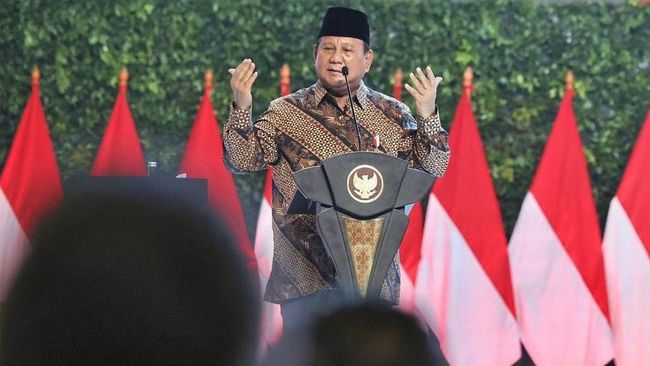Collaboration Between Formal and Informal Sectors: President Prabowo’s Strategic Move to Develop MSMEs
By: Maya Naura Lingga )*
President Prabowo Subianto continues to demonstrate strategic steps in developing Micro, Small, and Medium Enterprises (MSMEs) in Indonesia by encouraging collaboration between the formal and informal sectors.
This initiative is designed to strengthen the role of MSMEs as the backbone of the national economy, which not only absorbs a massive workforce but also contributes significantly to Indonesia’s Gross Domestic Product (GDP).
President Prabowo shows serious commitment in advancing MSMEs, a sector that has been supporting the economy of ordinary people and bolstering Indonesia’s economic resilience in various situations.
The Minister of MSMEs, Maman Abdurahman, conveyed that President Prabowo has instructed MSMEs in Indonesia to be able to develop and move up to higher levels. As the backbone of the country’s economy, MSMEs are expected to strengthen the economy at the lower and middle levels.
The Trisakti University alumnus affirmed that his ministry is formulating various strategies to facilitate the advancement of MSMEs, including exploring collaboration between the formal and informal sectors. This collaboration is believed to help MSMEs in creating strong supply chains and expanding their business scale.
Maman identified that one of the main obstacles for MSMEs is the often limited funding issue. Therefore, an integrative approach involving the formal sector is expected to provide broader financial support and increase MSMEs’ access to financing sources.
The Minister of MSMEs also explained that his ministry is undergoing internal consolidation following the separation from the Ministry of Cooperatives. This step is intended to strengthen the ministry’s effectiveness in advancing the MSME sector, while ensuring a smooth transition in the arrangement of organizational structure and human resources.
President Prabowo’s steps in supporting MSMEs are also evident through the plan to issue a Presidential Regulation (Perpres) on debt relief for MSME actors, including farmers and fishermen.
The debt relief policy is aimed at easing the burden on small business actors affected by the economic crisis. In the future, banks will eliminate the right to collect from borrowers whose debts have been written off, giving MSME actors the opportunity to restart their businesses without binding debt burdens.
The Chief Economist of Bank Permata, Josua Pardede, views this debt relief policy as a significant step that has the potential to bring positive impacts to the MSME sector. With debt elimination, MSME actors, farmers, and fishermen will gain liquidity relief that allows them to increase purchasing power and add capital to develop their businesses.
Josua assesses that this policy will strengthen local economic resilience, especially in labor-intensive sectors such as agriculture and fisheries, which are the mainstay of most MSME actors. Moreover, capital support from collaboration with the formal sector is expected to encourage MSME actors to be more confident in developing their businesses.
Furthermore, Citra Institute researcher, Efriza, considers that President Prabowo’s initiative to support MSMEs through collaboration between formal and informal sectors and debt relief demonstrates a strong vision and real commitment to developing a people-centered economy.
In Efriza’s view, the pro-people vision championed by President Prabowo, together with Vice President Gibran Rakabuming Raka, reflects the spirit of a government that prioritizes grassroots welfare.
Concrete steps such as providing nutritious meals and free milk, as well as support for small business actors, are proof that this government is truly on the side of the common people and is determined to continue the performance of the previous government that focused on advancing the community’s economy.
The programs initiated by the Prabowo-Gibran Administration also prioritize a vision of sustainable development that is expected to help Indonesia achieve developed country status by 2045.
Efriza assesses that these programs can strengthen public perception of the Prabowo-Gibran administration as a credible successor to the policies of the seventh President of Indonesia, Joko Widodo, who has contributed to building an inclusive economic foundation.
The government, under the leadership of the current eighth President of Indonesia, Prabowo Subianto, prioritizes policies that support economic stability by involving MSME actors as partners in development.
The approach taken by President Prabowo in building collaboration between the formal and informal sectors also opens up wider space for MSMEs to gain better market access.
This strategic step allows MSMEs to enter larger supply chains, maximizing their potential in meeting domestic and international market needs. The programs rolled out by the government are also expected to increase the competitiveness of Indonesian MSMEs amidst increasingly fierce global competition.
Overall, President Prabowo’s initiative in developing MSMEs by combining the strengths of the formal and informal sectors is part of efforts to strengthen the national economic foundation.
Through this synergy, President Prabowo demonstrates a great commitment to building a sustainable and inclusive economy. The support given to MSMEs will not only strengthen economic resilience but also create more jobs, increase people’s purchasing power, and ultimately contribute to national economic growth.
)* The writer is a contributor to Ruang Baca Nusantara
